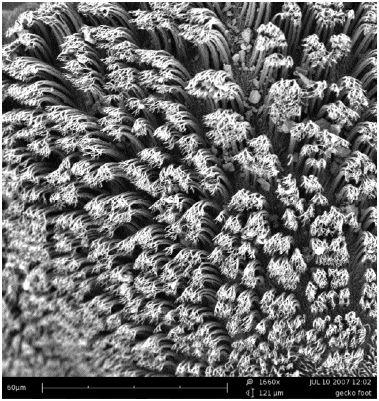DESCRIPTION
The gecko's amazing ability to cling to vertical or inverted surfaces is due to the interaction between nanoscale structures on its feet and tiny crevices on the wall or ceiling. The soles of gecko feet are made up of overlapping adhesive lamellae covered with millions of superfine hairs, or setae, each of which branches out at the end into hundreds of spatula-shaped structures. These flexible pads—each measuring only a few nanometers across—curve to fit inside unseen cracks and divots on the surface. The combined adhesion of these millions of pads holds the gecko in place. This striking property is being studied for use in the creation of new kinds of adhesive tapes, self-dissolving bandages, and high friction materials that can support loads on smooth surfaces. • IMAGING TOOL: Scanning electron microscope
DESCRIPTION
The gecko's amazing ability to cling to vertical or inverted surfaces is due to the interaction between nanoscale structures on its feet and tiny crevices on the wall or ceiling. The soles of gecko feet are made up of overlapping adhesive lamellae covered with millions of superfine hairs, or setae, each of which branches out at the end into hundreds of spatula-shaped structures. These flexible pads—each measuring only a few nanometers across—curve to fit inside unseen cracks and divots on the surface. The combined adhesion of these millions of pads holds the gecko in place. This striking property is being studied for use in the creation of new kinds of adhesive tapes, self-dissolving bandages, and high friction materials that can support loads on smooth surfaces. • IMAGING TOOL: Scanning electron microscope
OBJECTIVES
NANO CONTENT MAP
Nanometer-sized things are very small, and often behave differently than larger things do.
Nanoscience, nanotechnology, and nanoengineering lead to new knowledge and innovations that weren't possible before.
DOWNLOAD FILES
Credits
Cliff Mathisen, FEI Company - Attribution is required. The creator listed here has made this image available to NISE Network partners for non-profit educational use only. Uses may include but are not limited to reproduction and distribution of copies, creation of derivative works, and combination with other assets to create exhibitions, programs, publications, research, and websites.
The creator listed above has made this image available to NISE Network partners for non-profit educational use only. Uses may include but are not limited to reproduction and distribution of copies, creation of derivative works, and combination with other assets to create exhibitions, programs, publications, research, and websites.

